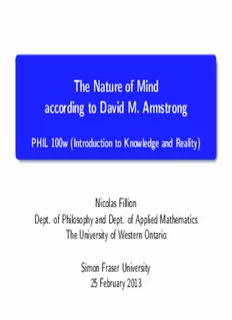
The Nature of Mind according to David M. Armstrong PDF
Preview The Nature of Mind according to David M. Armstrong
The Nature of Mind according to David M. Armstrong PHIL 100w (Introduction to Knowledge and Reality) Nicolas Fillion Dept. of Philosophy and Dept. of Applied Mathematics The University of Western Ontario Simon Fraser University 25 February 2013 having sensations having a perception having desires having purposes having thoughts having beliefs So, the question ‘what is mind?’ is associated with what is it to perceive? what is it to have emotions? etc. IntroductoryRemarks Physicalism Behaviorism&Dispositions TowardaNewConception Originsofthediscussion What is the nature of the mind? mind So, the question ‘what is mind?’ is associated with what is it to perceive? what is it to have emotions? etc. IntroductoryRemarks Physicalism Behaviorism&Dispositions TowardaNewConception Originsofthediscussion What is the nature of the mind? having sensations having a perception having desires mind having purposes having thoughts having beliefs IntroductoryRemarks Physicalism Behaviorism&Dispositions TowardaNewConception Originsofthediscussion What is the nature of the mind? having sensations having a perception having desires mind having purposes having thoughts having beliefs So, the question ‘what is mind?’ is associated with what is it to perceive? what is it to have emotions? etc. IntroductoryRemarks Physicalism Behaviorism&Dispositions TowardaNewConception Originsofthediscussion Now, of course, sometimes popular culture blurs things...Apparently, mindless zombies can now fall in love! ? ? Take a human. What is it? Is it just a body, a mechanism? Is there something else, a different type of ‘substance’? IntroductoryRemarks Physicalism Behaviorism&Dispositions TowardaNewConception Originsofthediscussion Given these associations, what the nature of mind is has important consequences for epistemology, metaphysics, ethics, religion, science, etc. ? ? Is it just a body, a mechanism? Is there something else, a different type of ‘substance’? IntroductoryRemarks Physicalism Behaviorism&Dispositions TowardaNewConception Originsofthediscussion Given these associations, what the nature of mind is has important consequences for epistemology, metaphysics, ethics, religion, science, etc. Take a human. What is it? ? Is there something else, a different type of ‘substance’? IntroductoryRemarks Physicalism Behaviorism&Dispositions TowardaNewConception Originsofthediscussion Given these associations, what the nature of mind is has important consequences for epistemology, metaphysics, ethics, religion, science, etc. ? Take a human. What is it? Is it just a body, a mechanism? IntroductoryRemarks Physicalism Behaviorism&Dispositions TowardaNewConception Originsofthediscussion Given these associations, what the nature of mind is has important consequences for epistemology, metaphysics, ethics, religion, science, etc. ? ? Take a human. What is it? Is it just a body, a mechanism? Is there something else, a different type of ‘substance’? But it was a hoax. IntroductoryRemarks Physicalism Behaviorism&Dispositions TowardaNewConception Originsofthediscussion In 1770, an inventor presented the Mechanical Turk to the Empress of Austria: The mechanism appeared to be able to play a strong game of chess against a human opponent.
Description: